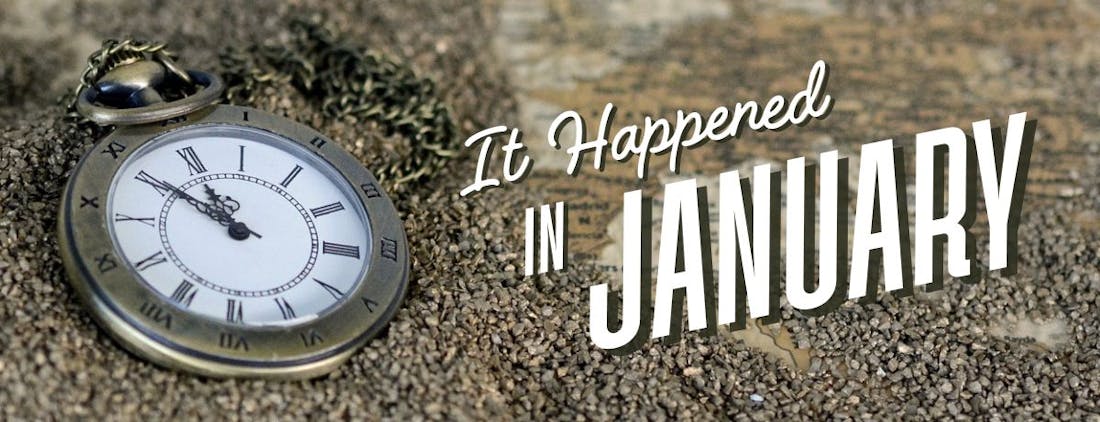
View Historical Events by Day: What Happened on January 28 in History?
Explore the historical events that shaped our world on January 28th. From major milestones to cultural achievements, see what happened on this day in history. Dates for earlier events may be approximate.
Note: Sources for the historical content shown, include research and reviews of relevant Online History Resources or printed material. When possible, we show a link to a source which provides additional or unique perspective about the event.
We do our best to provide accurate information but would appreciate being notified if any incorrect information is found. You may do so by using our Feedback link.
Charlemagne's son, Louis the Pious, succeeds him as Holy Roman Emperor.
Pope Clement II, who had been installed by Emperor Henry III, dies suddenly.
Alexios IV Angelos is crowned co-emperor of the Byzantine Empire, following the Fourth Crusade's arrival in Constantinople.
The city of Ryazan in Russia is captured and burned by Mongol forces under Batu Khan.
Richard II of England marries Anne of Bohemia, daughter of Emperor Charles IV.
The Treaty of Prenzlau is signed, ending the war between the Teutonic Order and Poland.
King Henry VII of England is born, later becoming the first Tudor monarch.
The Treaty of Olomouc is signed, establishing a peace settlement between Hungary and Austria.
The accession of Henry VIII to the throne of England after the death of his father, Henry VII.
The Diet of Worms begins in Germany, where Martin Luther defends his religious beliefs.
The Anabaptist movement starts in Zurich, Switzerland, with the first adult baptism by Conrad Grebel.
King Henry VIII of England dies, and his nine-year-old son Edward VI succeeds him as king.
The Treaty of Madras is signed between the English East India Company and the Maratha Empire.
The Treaty of Madras is signed between the English East India Company and the Maratha Empire.
English Quaker William Penn receives a land grant from King Charles II, founding Pennsylvania.
The Mughal Emperor Aurangzeb reopens the Hindu temple at Kashi Vishwanath in Varanasi, India.
France declares war on Spain, escalating the War of the Quadruple Alliance.
Christopher Wren, the English architect who designed St. Paul's Cathedral in London, dies at the age of 90.
The Grafton Estate in Virginia is established by the colonial governor, Sir William Gooch.
Sir Isaac Newton, renowned mathematician, physicist, and astronomer, dies in London at the age of 84.
The Spanish mission San Gabriel Arcángel is founded in California, becoming one of the oldest Catholic missions.
The British explorer and navigator John Ross reaches the North Magnetic Pole.
The Victoria Cross, the highest British military decoration, is established.
The U.S. Congress creates the Coast Guard by combining the Revenue Cutter Service was merged with the U.S. Life-Saving Service, and was officially renamed the Coast Guard. In 1939, the Lighthouse Service was folded in and the Commerce Department's Bureau of Marine Inspection and Navigation was added to the USCG in 1946.
A German cruiser sinks first American merchant ship, the William P. Frye, off the coast of Brazil. More
The first demonstration of television by John Logie Baird takes place in London.
A Soviet fighter shot down a U.S. T–39 training aircraft over East Germany. The three U.S. officers aboard were killed. More
The Nuclear Non-Proliferation Treaty is ratified by 43 nations.
The six United States embassy hostages in Tehran, Iran, are released.
The charity single "We Are the World" is recorded by USA for Africa.
The Space Shuttle Challenger explodes 73 seconds after liftoff, killing all seven astronauts aboard: Commander Michael J. Smith; Commander Francis R. 'Dick' Scobee; Ronald E. McNair, mission specialist; Ellison Onizuka, mission specialist; S. Christa McAuliffe, payload specialist; Gregory B. Jarvis, payload specialist; Judith A. Resnik, mission specialist. More






.png?auto=format,compress&fit=crop&w=280&h=280&q=93)







.jpg?format,compress&fit=crop&w=280&h=280&q=93)
.jpg?format,compress&fit=crop&w=280&h=280&q=93)

R.jpg?auto=format,compress&fit=clip&w=600)


















